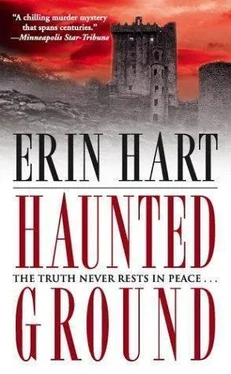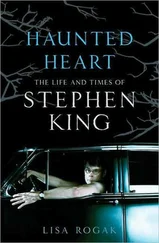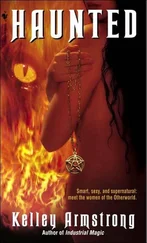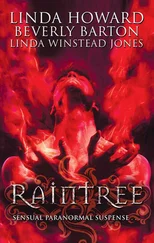Fintan waited for Una’s eyes to meet his, and his eyebrows raised in a question. He’d asked her advice earlier this afternoon; he was dying to break the news to Brendan about his plans to leave Dunbeg. She’d tried to put him off, saying that now wasn’t the time; as long as he wasn’t planning to leave until the autumn, there was no point in telling Brendan so soon. He’d only stew about it all summer, she warned. Fintan had disagreed. He still wanted to tell Brendan tonight. She could feel the anticipation in every gesture he made. He’d planned to go to America for years, he’d told her, but only recently had saved enough money to make it possible. He had enough to live on for a few months, anyway, even if he didn’t find work right away. And a friend in New York had promised to set up some gigs for him. Fintan was only two years younger than she was, but tonight Una felt decades older than her brother, seeing him practically bursting with the news.
What would this house be like without Fintan? Una wasn’t sure that she and Aoife could remain if he left, but leaving Brendan completely on his own was a thought she had tried to avoid.
She watched her elder brother as he held the sickle against his left knee, tracing the silvery half-moon shape of it over and over again with the pink round of a sharpening stone. Every few strokes, he’d pause to feel its edge against the thick skin of his thumb. It must soothe him somehow, to sit and smoke the pipe and work at these things. How sad that she couldn’t really talk to Brendan, and tell him what was in her heart, as she could do so easily with Fintan. But Brendan had always been so serious, trying to act like a grown man by the time he was fourteen years of age. He’d never seemed to have time to play when she was a girl, but then he was six years older than she was, already busy with farmwork when she and Fintan were still small.
Had Brendan ever given any thought to marrying? He’d certainly shown no interest in anyone she knew about. And there weren’t many opportunities for a social life in Dunbeg. Brendan was never one for dances or the other usual functions where people could meet. He went to Mass, of course, and he might go into the pub, but he’d always have his pint standing at the bar, nodding wordlessly to the half-dozen other regulars who drained their glasses beside him.
Brendan looked up from the sickle, not at her, but at Fintan, who held a reed up to the light to check its thickness. Brendan looked as if he were about to utter some expression of annoyance over his brother’s foolish waste of time, but instead he paused, evidently thought better of it, and returned to his work.
How much had she given up to come back here? She missed the laughing faces of her Dublin neighbors, Celia and Jane. Despite Dublin’s gray concrete walls, the graffiti-covered dustbins, the noise and grime of the city, Una had felt warmly accepted, enveloped, even, when she was with them. Celia worked in a bookshop; Jane was a writer. They were as poor as she was, but in a joyful, bohemian way that she always admired but could never quite achieve. Their flat was filled with books, with conversation and cigarette smoke. Perhaps what buoyed her friends was the love they shared, a tenderness forbidden where they came from, but tolerated, or at least ignored in the city, far from the prying eyes and clucking tongues of the villages where they’d grown up. Una had no such close friends in Dunbeg. What a relief it had been to be with Celia and Jane, to feel as if she could let go and say what she really thought. But another part of her spirit had never felt at home in the city. She had missed the smells, the sounds, even the very quietness of Dunbeg, the breathing space one could experience even in a room with several other souls. That silence, that solitude in company existed for her nowhere but here.
Una looked at her daughter’s bright head bent over her tiny tea set, as the child whispered an entire conversation in the various voices of her odd menagerie. Una understood Brendan’s desire to keep things as they had been forever. Weren’t there times—like this very moment, in fact—that she wished she could spare Aoife all the pain and disappointment of growing up? But she knew that sheltering her daughter from pain would also take away the profoundest joy, like the feeling she’d known when Aoife was born, seeing the damp crown of her daughter’s head covered in pale down. The nurses didn’t like it, but Una had sometimes unwrapped her completely, to drink in every detail of her compact and perfect naked body. You must keep the child covered up, they’d clucked, she’ll catch her death. As if death itself were contagious. Una had made up her mind to raise Aoife without shame, if she could, and took the greatest satisfaction in seeing her little girl growing up as blissfully alive in her physical self as Una had felt painfully repressed. Her parents had not been entirely to blame for that, she knew. It was the place, the time, and the stifling Catholic morality in the atmosphere they all breathed.
She was glad Fintan knew what he wanted. He had started at the tin whistle, and saved enough money for a set of practice pipes by the time he was thirteen. Brendan considered him lazy, she knew, but Fintan’s thoughts were always on the music, to the point of distraction at times. You can’t live on music, Brendan had often told him, but Una could see in Fintan’s eyes the fiercest desire to prove their brother wrong. For years, he’d worked all winter long weaving simple Brigid’s crosses to sell to tourist shops in Scarriff and Mountshannon, and he’d saved every penny he ever earned playing music for hire. Hardly laziness. Una also understood Fintan’s desire to explore the world beyond a place like Dunbeg, where the future was mapped out for you almost from birth, depending on who your father was, and how much tillable land you owned, and what the people in your family had done for generations upon generations. Tradition could be a prison sentence, as much as a point of pride.
The hidden things in Brendan’s room pressed on her heart more each day. There must be some plausible explanation. Surely. So why was she afraid? He’d always been a moody man, but the darkness seemed to have grown worse recently, and she’d started remembering things he’d said or done that troubled her. This morning, rounding the corner of the house, she’d remembered something that had taken place on that very spot nearly twenty years earlier: Brendan, about twelve years old, with a hen whose head he was about to strike off. He held the bird’s struggling body between his knees, stretching her neck with his left hand, and chopped the head off with one stroke of the bread knife. He looked up and saw Una but didn’t move or utter a word as the hen’s body quivered, and then went still. He studied her for a moment, then rose from his crouch, and held out the dripping carcass to her by its scrawny legs. Here, he said, take this to Mam. She thought he was trying to frighten her, but when she looked up at Brendan’s face, there was nothing in his eyes; his expression had been completely blank.
Disturbed by the memory, Una pulled the bar on the loom firmly back, then slid off her bench. “Come on, Aoife, love, time for slumber.”
“But, Mammy, it’s not even dark.”
“No, and it’s not going to be, either, until past your bedtime. Don’t you want to see where our book takes us tonight?” They’d been reading since the winter, one chapter each evening. Aoife’s face brightened, then clouded over again as she considered which prospect appealed to her most at the moment. Una loved to study the landscape of her daughter’s face, which was tempered by moods as changeable as Irish weather.
“Come on, upstairs with you now,” she said in a mock-threatening tone. “Give the lads a kiss.” She stood and waited as Aoife planted her lips firmly on Brendan’s whiskery cheek, then on Fintan’s. He looked at Una again, and there was mischief in his eyes.
Читать дальше











